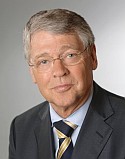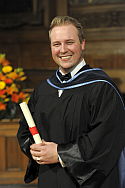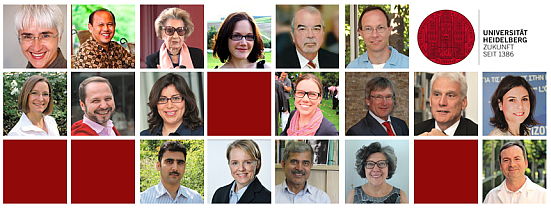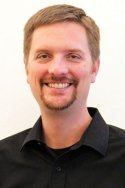MASNEWS 1/2015:
Introducing Newcomers - and a Way for Alumni to Keep in Touch

Welcome to the Heidelberg Center for American Studies’ MAS newsletter!
First of all, the HCA would like to extend to you heartfelt wishes for a prosperous and successful year 2015.
This issue surveys the 2014-15 academic year at the HCA. In October, we welcomed the MAS class of 2016. Current visiting professor Matthew Sutton and new MAS student Iulia Caizer report on their first weeks at the HCA. Ferdinand Sacksofsky, a former MAS student, shares how the MAS has furthered his subsequent professional career.
In addition, this issue introduces Heidelberg Alumni International (HAI), a worldwide network serving more than 9,000 former students and faculty of Heidelberg University.
Please feel free to forward this newsletter to friends and family who may be interested in American Studies or in the University of Heidelberg. Of course, we appreciate any feedback you would like to share with us. If you would like to learn more about the HCA’s recent developments, please have a look at our Annual Report 2013-14, which is now online.
Best regards,
Prof. Dr. Dr. h.c. Detlef Junker
HCA Founding Director
Welcome to the MAS
In October 2014, the HCA welcomed 14 new MAS students. The class of 2016 is made up of students from China, Romania, Turkey, the United Kingdom and the United States. Iulia Caizer from Romania tells us about her experiences during her first few weeks studying at the HCA.
 It was just the first week at the HCA and classes hadn’t even started yet when we had our first lesson. More precisely, in the orientation week, during our intercultural workshops we were asked to play a card game. We were divided into three groups and everyone had to play the game for five minutes following a certain set of rules written down on a piece of paper, without using verbal communication. After five minutes the winner and the loser had to switch tables and join the others for another round. However, the real fun began after switching tables because no one knew that every game table was playing by different rules. Facial expressions, laughter, raised eyebrows, gestures of all kinds, giggles, everything was there! However, the game had to go on, so consensus was reached! Thus, what at first seemed to be a simple game, eventually turned out to be a real life lesson! All of us come from different academic backgrounds, different cultures, being used to different kinds of rules, however, all of us when we applied to the MAS, had a common goal in our mind – broadening our education. Thus, we were shown that in order to achieve this, we have to open our minds and accept new ideas, even different ones from our own.
It was just the first week at the HCA and classes hadn’t even started yet when we had our first lesson. More precisely, in the orientation week, during our intercultural workshops we were asked to play a card game. We were divided into three groups and everyone had to play the game for five minutes following a certain set of rules written down on a piece of paper, without using verbal communication. After five minutes the winner and the loser had to switch tables and join the others for another round. However, the real fun began after switching tables because no one knew that every game table was playing by different rules. Facial expressions, laughter, raised eyebrows, gestures of all kinds, giggles, everything was there! However, the game had to go on, so consensus was reached! Thus, what at first seemed to be a simple game, eventually turned out to be a real life lesson! All of us come from different academic backgrounds, different cultures, being used to different kinds of rules, however, all of us when we applied to the MAS, had a common goal in our mind – broadening our education. Thus, we were shown that in order to achieve this, we have to open our minds and accept new ideas, even different ones from our own.
Keeping in mind what the American journalist Sydney J. Harris said, “the whole purpose of education is to turn mirrors into windows” the MAS program is definitely pursuing this higher aim of education, encouraging us to see beyond our own perceptions and community and open our minds so we can see through the glass at the wider world around us. Everything from the MAS students’ backgrounds, to the class size, interdisciplinary curricula and the inspiring academic backgrounds of our professors, to the scholars invited to talk at the weekly HCA Colloquium, provides us with the perfect context for our own new ideas to be born and shaped. From Emerson’s transcendentalism to Martin Luther King’s “Letter from Birmingham Jail” we are introduced to this world of great thinkers and ideas that shaped and inspired people around the world.
It’s only been just my first weeks of experience at the HCA and because of this research-oriented atmosphere where the traditional classroom is transformed into a joint venture of many scholars, I can overall say I feel extremely excited about my creativity being challenged and I’m looking forward to learning more.
Life After the MAS
Ferdinand Sacksofsky, who graduated from the MAS program in 2013, is now with eBay in Berlin, Germany. He reports on his current professional and academic activities.
 It was in 2011 during my internship with the Konrad-Adenauer-Foundation in Washington D.C., when I decided that I wanted to pursue a career in political interest representation. So when I received my Master's degree at the HCA in 2013, I had already started applying to various companies, foundations, political parties and consultancies. Yet, it took me quite a while until I was offered a six-month post-grad internship at the Government Relations Team of eBay in Berlin.
It was in 2011 during my internship with the Konrad-Adenauer-Foundation in Washington D.C., when I decided that I wanted to pursue a career in political interest representation. So when I received my Master's degree at the HCA in 2013, I had already started applying to various companies, foundations, political parties and consultancies. Yet, it took me quite a while until I was offered a six-month post-grad internship at the Government Relations Team of eBay in Berlin.
At eBay, my work was soon rewarded with growing competencies and more responsibilities, as well as a six-month extension. By the end of the year, I was representing eBay´s daughter company PayPal at several political working groups and public events, had lead a CSR campaign and finished a paper on skills and tools in e-commerce for the eBay Public Policy Center, which will be published in 2015. Unfortunately, due to internal global changes this year, my contract was not extended, and I am currently negotiating with a number of other companies.
Looking back now, I can say that the MA program at the HCA taught me quite a bit that I still use on a daily basis as a lobbyist. Besides the immense background knowledge about American society and culture, which helps a lot when working for an American company, or with U.S. citizens in general, I would emphasize three key skills that I have developed, or expanded at the HCA:
- Perseverance: Working with politicians or federal institutions to educate them about specific economic developments, so the legislative body considers the implication an upcoming decision might have, is a long-term business. With regard to the many issues, laws, and stakeholders a politician has in mind, it takes a lot of perseverance to follow your agenda and make sure that your lawmaker acknowledges your request. Perseverance is something I learned working on my thesis and the papers I wrote at the HCA. Knowing how to deal with working on a project for a long time without any major developments, or experiencing severe changes in strategy and approach while gathering new information, is something useful to learn for any job.
- Curiosity: The variety of topics and problems discussed at the HCA helped me develop a sense of open-mindedness towards issues that have not necessarily been on my radar yet. Working in tech, I am part of economic, social, and political developments that are constantly changing and reinventing themselves. Curiosity is a must-have at my job, in order to always stay informed and possibly even ahead of others.
- Reading and writing: During one of my first job interviews, I was told by the head lobbyist of a large international company that social scientists were his favorite on the job, because they knew how to read and write. Once I started working with bill proposals, position papers, and press statements, I realized what he meant. The countless hours of reading at the library and working on papers have taught me to summarize and simplify large and complicated texts and to put it on paper with only a few precise sentences, where every word counts.
Besides those, there are a number of other skills, methods, and personal attributes I developed at the HCA, which proved to be useful at my job. To name only a few, I am very confident in my presentation skills today, I can easily interact with people from all sorts of different cultural backgrounds, and I am now able to listen to a 9-minute presentation and summarize the key findings in only a few sentences.
In conclusion, I can say that my Master's at the HCA taught me well, even though I decided not to follow an academic career, but chose to work at the interface of business and politics. Whenever I am asked whether I would do it again, I can certainly say, that for me, it was a great choice and I would enroll again with the HCA at any time.
HAI - Heidelberg Alumni International
This section introduces Heidelberg Alumni International (HAI), a worldwide Network serving over 9,000 former students, scholars, and faculty members of Heidelberg University.

Swapna Bhattachary, a medical student from India, took the opportunity to participate in a one-year exchange program with Heidelberg University. On her return to India, she stayed connected with Heidelberg through HAI, the Heidelberg Alumni International platform. She was accepted for a research fellowship several months later because the professor knew Heidelberg, especially HAI, and was aware of the university’s well-deserved academic reputation.
Swapna is but one example of the many former students, who have benefited from the HAI network.
What is HAI?
HAI, Heidelberg Alumni International, is a worldwide platform and network – a community of current and former students, scholarship holders, scholars, and faculty and staff of Heidelberg University. Founded in 1996, HAI was one of the very first alumni platforms in Germany. Serving not only alumni but also current students, HAI is a worldwide community that offers services from exchange platforms to facilitating internships all around the world.
How does HAI work?
By creating an account with HAI, users gain access to a range of groups, similar to Facebook groups. These groups range from faculty groups to regional and international groups all around the world. Members can not only follow and participate in academic and cultural exchange via these groups, but can also participate in the groups' ongoing activities. HAI provides ongoing support for these groups, from arranging events to hosting and advertising seminars and lectures in Heidelberg to communicating reunion opportunities in Heidelberg.
What does HAI offer?
First, HAI connects by providing a platform for academic exchange. Second, the regional and international groups all over the world regularly organize meetings. Recently, for example, the medicine faculty group from the Class of 1983 hosted a series of events on “Medicine and Change.” Lectures, seminars and summer schools also offer various opportunities to join these communities. Third, and a very special feature of this alumni network, HAI initiated a mentoring program where alumni share their expertise with graduates and students. Finally, HAI edits an Alumni newsletter – HAInews – and an annual Magazine HAIlife.
How can former and current HCA students profit from HAI?
One HAI group that may be of particular interest to HCA students is "HAUS": Heidelberg Alumni U.S. HAUS is the alumni organization for all former students, exchange students, professors, fellows, and researchers who live in the United States. Headquartered in New York City, HAUS coordinates regional meetings across the country hosted by its regional chairs and also offers unique local programs, such as networking events, lectures, and more. HAUS is also currently planning mentoring opportunities for current and former students and researchers as well as the establishment of a scholarship fund.
Swapna Bhattachary's experience of profiting from competent HAI alumni as well as from HAI´s wide range of scope, may well encourage others to join, use and contribute to this network of academic expertise and career enhancement.
For more information and in order to register, please visit HAI's website.
For further information or questions about HAUS, contact HAUS@alumni.uni-heidelberg.de.
Welcome Professor Matthew Sutton
Matthew Sutton, the HCA's visiting professor for the academic year 2014-15, is the Edward R. Meyer Distinguished Professor of History at Washington State University. He teaches courses in twentieth-century United States history and religious history among other subjects. At the HCA, he lectures on "Religion in the Twentieth-Century U.S." Today, he provides a glimpse into his academic background, his first days as a professor in Heidelberg, and his plans at the HCA.
 My research focuses on the relationships among religion, politics, and American culture from the late nineteenth century to the present. A few central questions have driven my work over the course of my career. They include: how has religion functioned in ostensibly non-religious venues over the last 150 years (such as in American politics and popular culture)? How has religion shaped the ways certain groups of Americans have responded to the growth of the modern liberal state, economic challenges, and evolving geo-politics? How does religion intersect with race, gender, class, and sexual orientation in defining individuals’ lives? And finally, how does positioning American religions in a global context help us understand the trajectory of U.S. history? I have wrestled with these questions in numerous projects and am grateful to have the opportunity to pursue them further with students and colleagues at the HCA.
My research focuses on the relationships among religion, politics, and American culture from the late nineteenth century to the present. A few central questions have driven my work over the course of my career. They include: how has religion functioned in ostensibly non-religious venues over the last 150 years (such as in American politics and popular culture)? How has religion shaped the ways certain groups of Americans have responded to the growth of the modern liberal state, economic challenges, and evolving geo-politics? How does religion intersect with race, gender, class, and sexual orientation in defining individuals’ lives? And finally, how does positioning American religions in a global context help us understand the trajectory of U.S. history? I have wrestled with these questions in numerous projects and am grateful to have the opportunity to pursue them further with students and colleagues at the HCA.
While at the HCA this year, I will be working on a new book tentatively entitled Gods of War: Religion and American Espionage in World War II. In this project I argue that religion was central to the American wartime arsenal. Franklin Roosevelt claimed that the Allies were battling to secure global freedom of religion, American spies recruited foreign priests to foment insurgencies, and devout missionaries served as covert agents. I analyze the role that religion played in the war as a political and ideological tool, as a secret weapon employed by various men and women working in intelligence, covert operations, and espionage, and as a form of identity that could open doors and facilitate alliances. In these and many other ways, Americans deployed religion and exploited the power of religious identities to great effect. Their work set precedents for the Cold War-era actions of the CIA, the American crusade against “godless communism,” and, more recently, George W. Bush’s “war on terror.” To make these arguments, I draw on the actions and ideologies of hundreds of characters of all faiths and nationalities spread around the globe. They include a German priest who aspired to be a secret agent, a future CIA director who aggressively recruited religious activists for covert operations, and a fundamentalist Christian missionary-turned-spy. Their work, with its unintended consequences and violent twists and turns, ensured that faith was always close to the fight.
I have just published American Apocalypse: A History of Modern Evangelicalism with the Belknap Press of Harvard University Press and I am excited to have had the opportunity to launch the book this past November at the HCA. A comprehensive history of American fundamentalism and evangelicalism from the 1880s to the present, American Apocalypse shows how a colorful and charismatic group of radical Protestants, anticipating the end of the world, paradoxically transformed it. Perceiving the United States as besieged by Satanic forces—communism and secularism, family breakdown and government encroachment—Billy Sunday, Charles Fuller, Billy Graham, and many others took to the pulpit and airwaves to explain how Biblical end-times prophecy made sense of a world ravaged by global wars, genocide, and the threat of nuclear extinction. Rather than withdraw from their communities to wait for Armageddon, they used what little time was left to warn of the coming Antichrist, save souls, and prepare the United States for God’s final judgment.
Finally, in addition to pursuing my research, I am very much enjoying my time in the classroom here and learning to “see” American history through the eyes of those not born and raised in the United States. I am excited to be learning alongside my students.
Further News
Studying in Heidelberg
The HCA invites applications for the MAS class of 2017. Our online application is open until March 31, 2015.
For those who would like to revel in or recall the Heidelberg spirit, check out this recent flash mob in the Marstall Mensa, one of the university's student cafeterias.
Upcoming Events
This year's HCA commencement will take place on April 24, 2015. Mark your calendars and make sure to look up the HCA website for a livestream link.
Imprint
Heidelberg Center for American Studies (HCA)
Curt und Heidemarie Engelhorn Palais
Hauptstraße 120
69117 Heidelberg
Tel.: + 49 6221 543710
E-Mail: hca@uni-hd.de
www.hca.uni-hd.de
Distributed by postina.net, Heidelberg
This is a cost-free, non-profit service. No addresses or other information will be forwarded to third parties.


 Graduiertenkolleg
Graduiertenkolleg